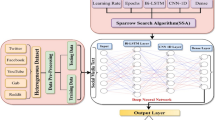Abstract
Hate speech is about making insults or stereotypes towards a person or a group of people based on its characteristics such as origin, race, gender, religion, and more. Thus, hate speech can be classified using machine learning and deep learning methods, and it gives a distinguished output from one class to another. Also, every day tons of data are getting accumulated from social media. However, the single deep learning model cannot provide the diversified feature for text classification due to data characteristics. Therefore, this paper proposes two methods for hate speech classification. Initially, a majority voting classifier with three deep learning hybrid models is presented. Finally, a multi-channel convolutional neural network with a bi-directional gated recurrent unit and capsule network is introduced. The proposed approach helps in improving the classification accuracy and ground truth information by reducing ambiguity. The proposed models are verified using six different data sets. The experimental outcomes demonstrate that the proposed methods achieve adequate results for hate speech classification.
Access this chapter
Tax calculation will be finalised at checkout
Purchases are for personal use only
Similar content being viewed by others
Notes
- 1.
- 2.
- 3.
- 4.
- 5.
- 6.
- 7.
- 8.
References
Alorainy, W., Burnap, P., Liu, H., Williams, M.L.: “The enemy among us’’: detecting cyber hate speech with threats-based othering language embeddings. ACM Trans. Web 13(3), 1–26 (2019)
Basak, R., Sural, S., Ganguly, N., Ghosh, S.K.: Online public shaming on Twitter: detection, analysis, and mitigation. IEEE Trans. Comput. Soc. Syst. 6(2), 208–220 (2019)
Chaudhari, A., Parseja, A., Patyal, A.: CNN based hate-o-meter: a hate speech detecting tool. In: 2020 Third International Conference on Smart Systems and Inventive Technology (ICSSIT), pp. 940–944 (2020)
Cheng, Y., Yao, L., Xiang, G., Zhang, G., Tang, T., Zhong, L.: Text sentiment orientation analysis based on multi-channel CNN and bidirectional GRU with attention mechanism. IEEE Access 8, 134964–134975 (2020)
Cho, K., et al.: Learning phrase representations using RNN encoder-decoder for statistical machine translation. arXiv:1406.1078 (2014)
Fortuna, P., Nunes, S.: A survey on automatic detection of hate speech in text. ACM Comput. Surv. 51(4), 1–30 (2018)
Goodfellow, I., Bengio, Y., Courville, A.: Deep Learning, vol. 1. MIT Press, Cambridge (2016)
Gui, L., Jia, L., Zhou, J., Xu, R., He, Y.: Multi-task learning with mutual learning for joint sentiment classification and topic detection. IEEE Transactions on Knowledge and Data Engineering pp. 1–13 (2020)
Hingu, D., Shah, D., Udmale, S.S.: Automatic text summarization of wikipedia articles. In: 2015 International Conference on Communication, Information Computing Technology (ICCICT), pp. 1–4 (2015)
Kim, J., Jang, S., Park, E., Choi, S.: Text classification using capsules. Neurocomputing 376, 214–221 (2020)
Liu, H., Burnap, P., Alorainy, W., Williams, M.L.: A fuzzy approach to text classification with two-stage training for ambiguous instances. IEEE Trans Comput. Soc. Syst. 6(2), 227–240 (2019)
Naseem, U., Razzak, I., Eklund, P.W.: A survey of pre-processing techniques to improve short-text quality: a case study on hate speech detection on twitter. Multimedia Tools Appl. 1–28 (2020). https://doi.org/10.1007/s11042-020-10082-6
Paschalides, D., et al.: MANDOLA: a big-data processing and visualization platform for monitoring and detecting online hate speech. ACM Trans. Internet Technol. 20(2), 1–21 (2020)
Sequeira, R., Gayen, A., Ganguly, N., Dandapat, S.K., Chandra, J.: A large-scale study of the Twitter follower network to characterize the spread of prescription drug abuse tweets. IEEE Trans. Comput. Soc. Syst. 6(6), 1232–1244 (2019)
Tang, D., Qin, B., Wei, F., Dong, L., Liu, T., Zhou, M.: A joint segmentation and classification framework for sentence level sentiment classification. IEEE/ACM Trans. Audio Speech Lang. Process. 23(11), 1750–1761 (2015)
Udmale, S.S., Singh, S.K., Bhirud, S.G.: A bearing data analysis based on kurtogram and deep learning sequence models. Measurement 145, 665–677 (2019)
Zhao, R., Mao, K.: Cyberbullying detection based on semantic-enhanced marginalized denoising auto-encoder. IEEE Trans. Affect. Comput. 8(3), 328–339 (2017)
Acknowledgement
We thank the Department of Computer Engineering and Information Technology of the Veermata Jijabai Technological Institute (VJTI), Mumbai-19, for their support and for providing access to the high-performance computing resources developed under TEQIP.
Author information
Authors and Affiliations
Corresponding author
Editor information
Editors and Affiliations
Rights and permissions
Copyright information
© 2021 Springer Nature Switzerland AG
About this paper
Cite this paper
Shah, V., Udmale, S.S., Sambhe, V., Bhole, A. (2021). A Deep Hybrid Approach for Hate Speech Analysis. In: Tsapatsoulis, N., Panayides, A., Theocharides, T., Lanitis, A., Pattichis, C., Vento, M. (eds) Computer Analysis of Images and Patterns. CAIP 2021. Lecture Notes in Computer Science(), vol 13052. Springer, Cham. https://doi.org/10.1007/978-3-030-89128-2_41
Download citation
DOI: https://doi.org/10.1007/978-3-030-89128-2_41
Published:
Publisher Name: Springer, Cham
Print ISBN: 978-3-030-89127-5
Online ISBN: 978-3-030-89128-2
eBook Packages: Computer ScienceComputer Science (R0)




